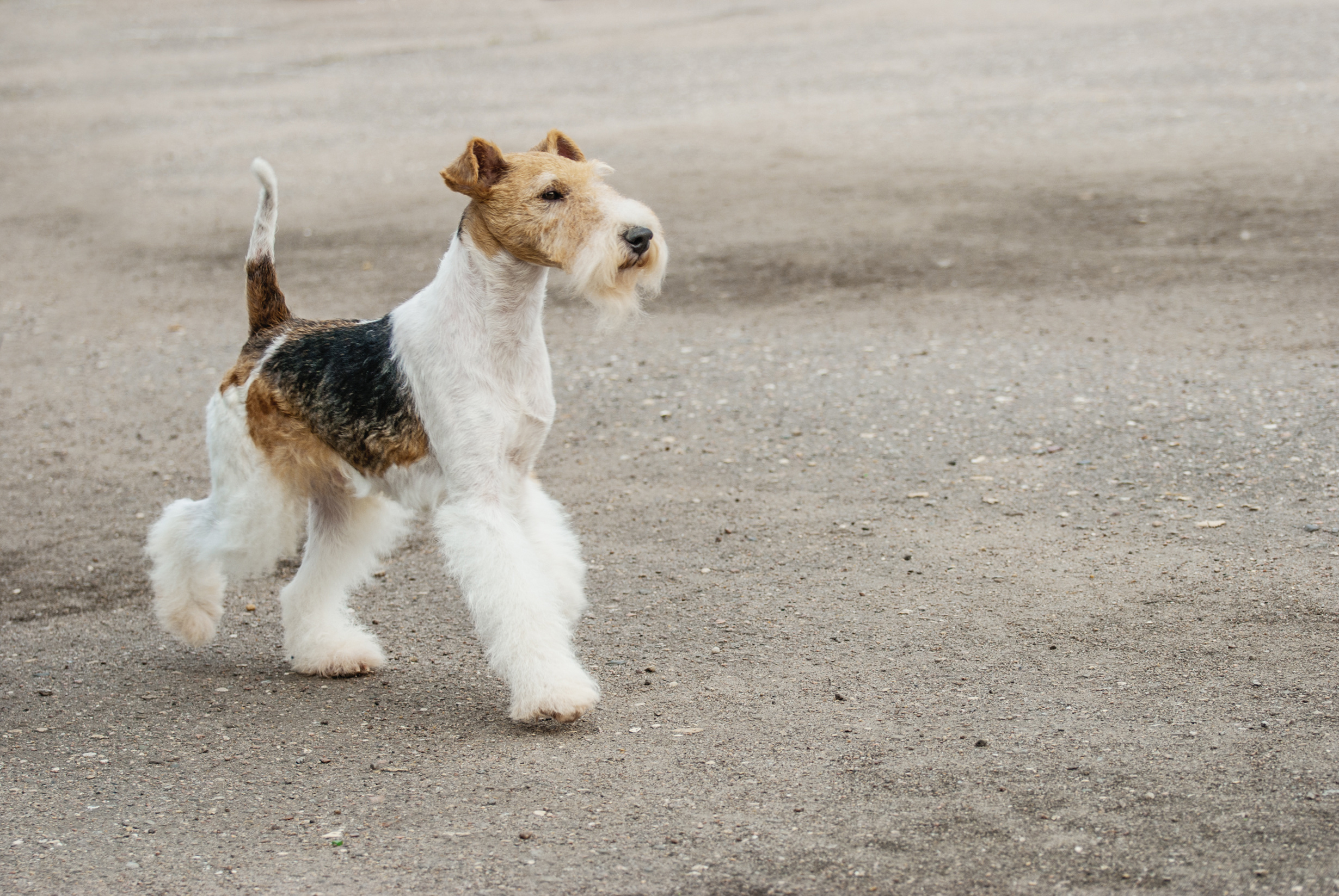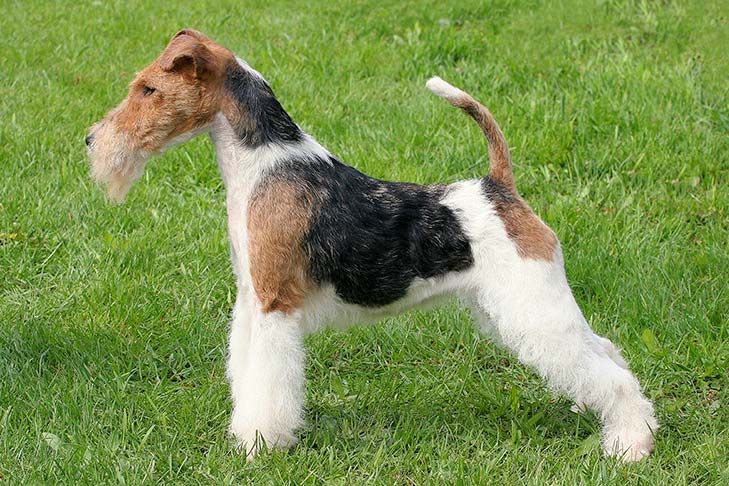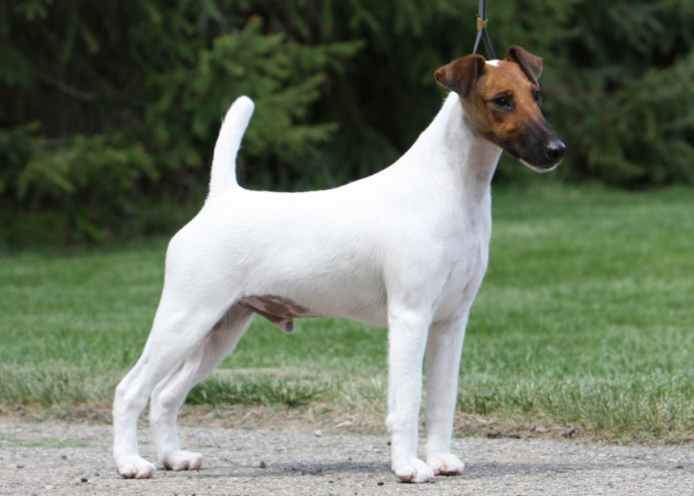
Learn more about Fox Terriers
The Fox Terrier in both forms, Smooth and Wire, is known throughout the world, but is from British origins. It probably owes its’ existence to the same types of dog that produced both the Bull Terrier and the Black and Tan (now Manchester) Terrier. Uniformity of type was established in the late 1800s when the original standard for the Fox Terrier was drawn up in 1876.
Smooth Fox Terrier
Wire Fox Terrier
History
The Wire is thought to have come about from crosses of the Old English Terrier, smooth coated Black and Tan terriers of England, Bull Terriers, Greyhounds and Beagles.
They were used by hunters with the foxhounds to locate foxes when they went to ground by barking and so pinpointing the position of the fox for the huntsman.
They can be traced back to the middle of the 19th century when both smooth and broken coated were from the same origins and classed as one breed.
Later, devotees of both coats bred like to like and developed the Wire and Smooth Fox Terrier as we know it today.
The breed Standard for this dog was drawn up in 1876 by Officers of The Fox Terrier Club, there are few differences with today’s Standard. Now the weight for dogs is more clearly stated and docking is no longer permitted
Character & Temperament
In general the Wire is a friendly, devoted and affectionate dog with lots of personality. They can be protective if they feel a member of their family is in danger or being threatened. In the past they have had a reputation of being a bit snappy and wilful but if you select your puppy carefully this should not be a problem. Wires get on well with children and do make ideal family pets.
They have to be socialised from an early age especially with cats and any other household pets.
Keen gardeners may find that this dog digs up their plants rather quickly as digging is one of their favourite pastimes if not corrected, but as with many other breeds, with initial training this is not a problem.
They may be troublesome with other dogs if not properly socialised.
Grooming
Grooming the Wire does require a bit of time and it can be expensive, as you may need to get a professional groomer to keep the dog’s coat looking its best.
Hand stripping of the coat will be necessary several times a year; this can be time consuming so you may find it easier to get someone else to do it for you.
'Hand stripping' means that the hair is pulled out rather than cut with scissors or clippers. If the hair is not trimmed it continues to grow in length, the hair does not moult like many other breeds. In the wild longer dead hairs would naturally be pulled out as they run through bushes and brambles - thus keeping their coat short.
If a Wire's coat is cut it tends to lose it's characteristic wiry texture and the colours become pale.
The distinctive Wire Fox Terrier trimming should be first carried out when the puppy is around three months old. The Wire should be brushed and combed several times a week to keep the coat clean and tangle free.
To prepare a Wire’s coat for a show requires effort beyond what is generally needed to keep them neat and smart looking.
Work would normally begin many weeks before a show. 'Professional Handlers' are frequently used by owners to prepare the coat, get the dog into top condition and show the dog.
Preparing a Wire's coat to show standard is a skill which can be learnt from other exhibitors in conjunction with practice.
History
The Smooth is thought to have come about from crosses of the Old English Terrier, smooth coated Black and Tan terriers of England, Bull Terriers, Greyhounds and Beagles.
They were used by hunters with the foxhounds to locate foxes when they went to ground by barking and so pinpointing the position of the fox for the huntsman.
They can be traced back to the middle of the 19th century when both smooth and broken coated were from the same origins and classed as one breed.
Character & Temperament
In general the Smooth is a friendly, devoted and affectionate dog with lots of personality. They are a good watchdog and can be protective if they feel a member of their family is in danger or being threatened. Smooths get on well with children and do make ideal family pets.
They have to be socialised from an early age especially with cats and any other household pets.
Keen gardeners may find that this dog digs up their plants rather quickly as digging is one of their favourite pastimes if not corrected, but as with many other breeds, with initial training this is not a problem.
They may be troublesome with other dogs if not properly socialised.
Grooming
Grooming the Smooth is relatively easy as they are clean little dogs.
A rubber grooming mitt or stiffish brush used twice a week will remove any dead and loose hair reducing the amount of hair that is shed.
If the coat becomes wet or muddy it does not take long to dry. It is then easier to remove the dirt from the coat when it is dry.
Coat preparation for a show will generally involve some additional trimming and a bath.
Information for both Smooths and Wires
Original Purpose
They are both members of the terrier group, originating from Great Britain. They were originally used for locating the position of foxes in their tunnels, killing vermin and hunting rabbits. Today they are still used as hunters but more commonly as companions.
Exercise Requirements
Fox Terriers should have lots of exercise, they are full of energy and like nothing better than a long walk. They do well in agility and fly ball games. They will happily join in with any outdoor games where the children are playing, the rougher and dirtier the better.
They should be kept on a lead near traffic under proper control as they do have a tendency to chase cats or anything else that catches their attention, only because they love to play chasing games. A fully fenced in garden is recommended. They can live with cats in their own home but outside they will chase them
Intelligence & Trainability
Fox Terriers are intelligent terriers but can be a bit stubborn, like most terriers. Training is relatively easy but owners must be consistent and firm. They like to bark and dig so must be trained to stop these actions on command. They can be quite dominant over other dogs so should be properly socialised as puppies. They are not easy to obedience train, which is why it is usually safer to exercise them on a lead in public places or anywhere they could get themselves into mischief!
Ailments
As a breed the Fox Terrier is a hardy dog that doesn’t suffer from many health problems; and any problems they do have tend to be as individuals and non-breed specific. The breed’s hardy constitution and known longevity has never led to the need for breed testing for clinical or hereditary defects. The breed is suitable for hot, sunny climates but thrives in cool climates
Feeding
The Fox Terrier is not demanding in its feeding requirements. They do eat a lot considering their size but they are active little dogs.
Guide to Buying a Fox Terrier
What You Need to Know:
Dogs in general are very demanding, so if you are not prepared to make a commitment perhaps you should consider some other less demanding animal.
Fox Terriers have an average life span of between 12 and 14 years; in which time you will have invested a fair amount of time, energy and money.
Who will be responsible for the care and training?
Will this be undertaken by all members of the family or just left to one person.
Is this person young or old; will they need help with feeding and training?
There are several books available to help with the care and training of your puppy which can be obtained from most libraries.
Before deciding on a puppy consider the following points:
See both the sire and dam of the puppy and if possible the grandparents, also older siblings of the puppy.
Is the environment in which the puppies are being reared clean, and do the puppies look healthy?
Would the breeder be willing to offer help and advice should problems arise later with the puppy?
Does the breeder raise the type of Fox Terrier you would like and in a manner, which appears to be caring and conscientious?
If you find after acquiring your puppy that it is unsuitable for whatever reason to your requirements would the breeder take the puppy back
Health care:
Ask the breeder about vaccinations and worming. Are there any known health concerns in this bloodline?
Has the puppy been seen by a veterinarian and given a clean bill of health?
Would it be sensible to have a dog neutered and a bitch spayed - find out the cost of performing these operations as they can be expensive, especially spaying.
Look around before buying. Only buy from a breeder who you consider reliable and ethical and raises puppies in a healthy environment, as only then can you be sure of the genetic health behind the puppy.
Tell the breeder what you expect/hoping to achieve with the puppy. What your lifestyle is like and anything else you think the breeder should know. Often the breeder will want to quiz you on your suitability as the owner of one of their Fox Terriers; most breeders want to make sure that their puppies are being placed in an environment that suits the puppy.
Choosing your puppy:
It has been said that `the puppy for you will find you' but this is not necessarily the case.
Go to see the litter on two separate occasions if possible. As the puppy
that seems lethargic may have been playing and is now ready for a nap and the litter mates who are full of life have just woken from theirs.A good breeder knows their puppies and may be-able to make a suggestion as to which puppy would suit your lifestyle.
Keep in contact with the breeder. Caring breeders are always interested to hear about their puppies, and should be the first to know if you encounter any problems. Breeders provide a good source of information on health care, diet and training.
Owning a dog is a commitment. So should you find yourself unable to continue this commitment, please do not abandon your dog to just any rescue service, instead contact the breeder who will do their best to help find your Fox Terrier a new home.



